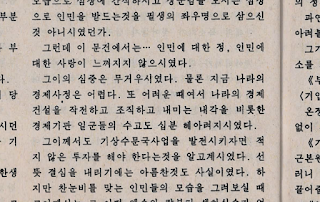The first was that, since I simply did not have time to translate entire stories, I would simply summarize the boring sections and put greater effort into translating the particularly interesting sections verbatim, taking as much care as possible to faithfully represent the original Korean text. These "faithful representations" are indented to distinguish them from summary text and editorial commentary.
But faithful representation is particularly difficult with certain aspects of Korean that simply do not exist in English. For instance, the use of honorific/humble speech is of particular importance in these stories - Kim Jong Un uses honorific speech so rarely that when he does so it makes a crucial statement about the social status of the individual he is addressing. And yet there is no good way of rendering such distinctions in English. I have occasionally used parenthetical notes for this purpose.
 |
| Text from "Our Heavens" |
I decided that the closest (albeit imperfect) English equivalent would be the capitalized "He" used to refer to certain deities in religious texts. Therefore, in the indented verbatim texts, wherever you see a capitalized male pronoun, this indicates that the original Korean used the term 그이.